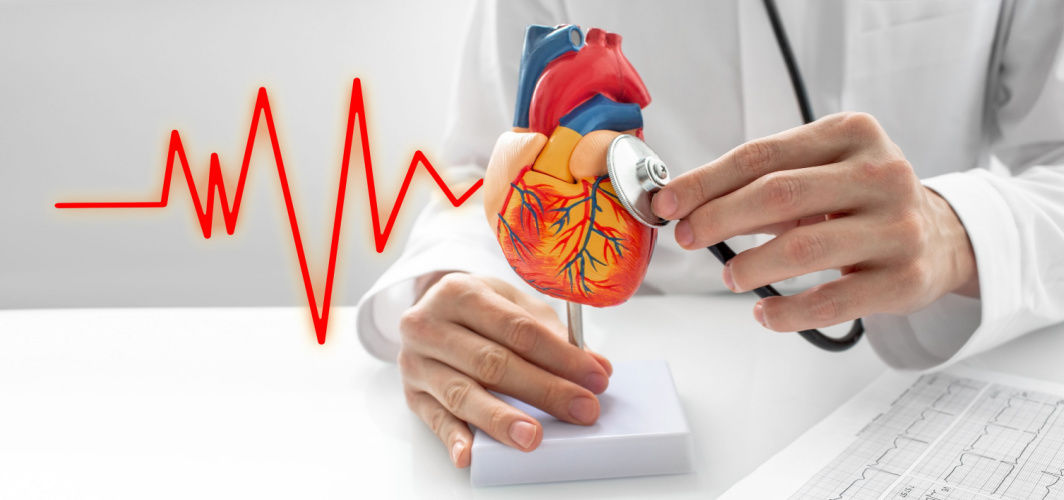Heart Conditions
ECG vs Echo: Know the Difference Between Electrocardiogram vs Echocardiogram
6 min read
By Apollo 24|7, Published on - 22 June 2023, Updated on - 07 August 2024
Share this article
0
0 like

Heart conditions can range from minor concerns, that require monitoring, to acute, life-threatening problems necessitating immediate treatment. To determine the severity and type of your heart condition, specialized diagnostic tests are conducted. Two commonly recommended tests to detect heart problems are the electrocardiogram (ECG/EKG) and echocardiogram (echo). These non-invasive tests are capable of identifying abnormalities in the heart muscles, valves, and heartbeat rhythm. Read on to learn the distinctions between ECG and ECHO tests and how they can provide crucial insights into your cardiac health.
What is an Echocardiogram (Echo)?
An echocardiogram, commonly referred to as an echo, is a non-invasive live-imaging test that provides a detailed examination of the structure and functionality of the heart and blood vessels. By utilizing high-frequency sound waves, this procedure enables real-time visualization of the heart and its various components, as the emitted sound waves bounce back and create an echo. This allows healthcare professionals to observe and assess the movement and characteristics of the heart efficiently.
What is an Electrocardiogram (ECG)?
An electrocardiogram, commonly referred to as ECG or EKG, is a non-invasive diagnostic test that is used to measure the heart’s electrical activity. This test captures the impulses responsible for the heart's contractions, enabling the pumping of blood throughout the body. ECG machines provide valuable insights into the heart's electrical patterns and aid in the diagnosis of various cardiac conditions.
Difference Between ECG and Echo
Here are the major differences between these two similar-sounding diagnostic tests.
1. How are Echo and ECG Tests Done?
ECG: During an ECG, you will be asked to lie down on your back, and several small adhesive sensors called electrodes will be attached to your limbs and chest. These electrodes are connected to a computer, which records and analyses the electrical impulses responsible for your heart's contractions. The resulting data is displayed as waves on a monitor.
Echo: An echo involves placing a transducer on your chest, which emits sound waves and receives their echoes when they bounce off the heart. The computer processes these echoes and converts them into a visual image.
2. What is the Purpose of Echo and ECG Tests?
ECG: An ECG is a crucial tool for diagnosing and monitoring heart-related conditions. It is commonly performed when individuals experience symptoms that may indicate heart problems. Your doctor may recommend an electrocardiogram if you:
- Complain of chest pain
- Report dizziness
- Have irregular heartbeats
- Experience shortness of breath
Echo: An echo test is essential for assessing the pumping function of your heart's chambers and valves, as well as examining the blood flow throughout the organ. The results obtained from an echocardiogram aid your doctor in diagnosing potential heart conditions. You may undergo an echocardiogram if your doctor suspects you have:
- Heart disease
- Blood clots
- A heart defect
- An infection
- A tumor
Also read: Know About Echocardiogram: Echo Tests, Procedures, Preparation, And Reports
3. How Long Does it Take for an Echo and an ECG?
ECG: An ECG typically takes approximately 5 minutes to complete. This brief test primarily involves positioning the leads on the patient's body, with only a few seconds required to generate the tracing.
Echo: Contrarily, an echo test generally requires at least 20 minutes. The initial five minutes are allocated to preparation, while the subsequent 15 minutes are dedicated to imaging the heart. The duration of both of tests may vary based on the specific information needed by the doctor, potentially extending the test duration further.
4. What are the Uses of Echo and ECG Tests?
ECG: An ECG is used to record the heart’s electrical activity, providing valuable information about the heart rate, regularity of the heartbeat, and rhythm. It serves as a quick screening method for:
- Detecting arrhythmias
- Identifying heart muscle damage caused by a heart attack
- Assessing the condition of implanted devices like pacemakers
- Diagnosing certain congenital conditions
- Evaluating the effects of prescribed medications
Additionally, an ECG is often included in a routine health check-up and as part of the preoperative assessment before major surgeries.
Echo: An echo test, on the other hand, offers a comprehensive assessment of the heart by examining its size, shape, tissue damage, pumping capacity, internal chambers, and valve function. It is particularly useful in:
- Evaluating the heart muscle after a heart attack
- Detecting infections in the heart valves and the sac around the heart
A colour doppler echocardiogram provides accurate information about the blood flow through the heart, aiding in the diagnosis and management of various cardiac conditions.
5. What are the Risks of Echo and ECG Tests?
ECG: An ECG is a safe, non-invasive and painless procedure that poses no major risks. However, though rare, you may experience minor skin irritation or develop a mild rash where the electrodes are attached.
Echo: An echocardiogram is also a painless, completely non-invasive procedure that doesn’t use any harmful radiation. So, it is completely safe and does not have any risks.
Takeaway
All in all, both ECG and echo tests play pivotal roles in evaluating heart health, offering distinct perspectives and valuable insights for accurate diagnosis and effective management of cardiac conditions. Apart from these imaging tests, there are some diagnostic tests that can help evaluate heart health.
To determine your heart health, Apollo’s Heart Check Test
If you have any queries, consult an expert cardiologist.
FAQ
Q. Which is better, echo or ECG?
Depending on what function of the heart is needed to be evaluated, your doctor may prescribe either echo or ECG. However, an ECHO is considered more comprehensive as it gives a clearer picture of the functioning of your heart valves.
Q. Is an echo test needed if the ECG is normal?
Typically, an echo test is prescribed if the ECG shows any heart rhythm abnormalities. However, depending on which condition you are being checked for, it may also be ordered if your ECG is normal.
Q. Which is more expensive: echo or ECG?
An echo is usually more expensive than an ECG. The prices of the tests depend on the lab, its location and a variety of other factors.
Q. Can an ECG detect a stroke?
An ECG can help detect a heart problem that may lead to a stroke later in life.
Q. Can ECG be normal in a blockage?
Yes, it can. Since an ECG may not be able to diagnose blocked arteries accurately, your doctors may recommend an echo or another test.
Medically reviewed by Dr Sonia Bhatt.
Heart Conditions
Consult Top Cardiologists
View AllLeave Comment
Recommended for you

Heart Conditions
Better Heart Care Using the Power of Digital Health
World Heart Day 2021 aims to explore innovative ways to use digital health to improve awareness, prevention and management of CVD across the globe.
.jpg?tr=q-80)
Heart Conditions
From Causes to Control: An Overview of Hypertension
Hypertension affects millions of people worldwide, including many in India. Hypertension or high blood pressure is when the blood pressure is continuously high. The force of blood against artery walls while the heart pumps blood is known as blood pressure. Hypertension can put one at risk for heart disease, stroke, and renal failure, among other conditions. To effectively manage this condition, routine examinations and early detection are essential.

Heart Conditions
Does Stress Increase the Risk of Hypertension and Cardiovascular Problems?
According to a new study, higher levels of stress can increase one’s risk of high blood pressure and cardiovascular events such as heart attack or stroke.
Subscribe
Sign up for our free Health Library Daily Newsletter
Get doctor-approved health tips, news, and more.
Visual Stories

Can Processed Meat Increase the Risk of Chronic Diseases?
Tap to continue exploring
Recommended for you

Heart Conditions
Better Heart Care Using the Power of Digital Health
World Heart Day 2021 aims to explore innovative ways to use digital health to improve awareness, prevention and management of CVD across the globe.
.jpg?tr=q-80)
Heart Conditions
From Causes to Control: An Overview of Hypertension
Hypertension affects millions of people worldwide, including many in India. Hypertension or high blood pressure is when the blood pressure is continuously high. The force of blood against artery walls while the heart pumps blood is known as blood pressure. Hypertension can put one at risk for heart disease, stroke, and renal failure, among other conditions. To effectively manage this condition, routine examinations and early detection are essential.

Heart Conditions
Does Stress Increase the Risk of Hypertension and Cardiovascular Problems?
According to a new study, higher levels of stress can increase one’s risk of high blood pressure and cardiovascular events such as heart attack or stroke.



